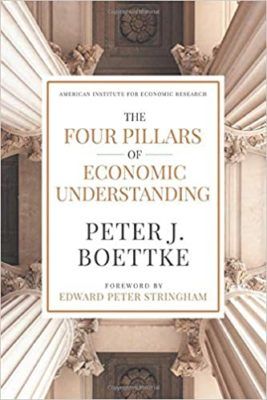In Defense of the Teaching Mission
“Only through constant iteration,” wrote Herbert Spencer, “can alien truths be implanted upon reluctant minds.”
My teacher James M. Buchanan often repeated this in class back in the early 1980s when I was a graduate student. Buchanan stressed in his classes the basic principles of economics, and their consistent and persistent application. He was simply following in the tradition of his teacher — the great Frank Knight. It was Knight who alerted Buchanan to the Spencer quote, and it was Knight who stressed that economics was in many ways little more than applied common sense.
In 1950, when Knight gave his presidential address to the American Economic Association, he told his audience: “The serious fact is that the bulk of the really important things that economics has to teach are things that people would see for themselves if they were willing to see. And it is hard to believe in the utility of trying to teach what men refuse to learn or even seriously listen to.” This requires that we ask, why might individuals refuse to see what they should be able to see for themselves? The standard argument that has been given through the years is threefold.
First, economics is counterintuitive in a fundamental way. The central theoretical puzzle of economics is undesigned order, and thus our theoretical quest begins with us trying to explain outcomes that are not implied in the intentions of the participants. If the outcomes were simply a matter of the intentions of the actors, then our theoretical task would be trivial and there would be no central mystery to unravel. Good people do good things, bad people do bad things — you want to improve society, reward good people, penalize bad people. It would be that simple, and since we can in this world infer intentions from outcomes a simple observation of the world would do enough to sort out the good people from the bad people. But that is precisely what economics and social science cannot do.
Theoretical social science is required precisely because intentions do not equal results, and thus we can have both “Private vices translate into public virtues” and “The path to hell is paved with good intentions.” Sorting out the reasons why some situations tend one or the other way is complicated and requires detailed analysis of both the pure logic of choice and the institutional analysis of situational logic, and provides the subject matter at the core theory of our discipline.
Second, this detailed analysis requires long chains of reasoning and this means that many are either unwilling or incapable of following the argument to its end. It is easier to cut the story off too short. This, in essence, is what Bastiat and Hazlitt tried to get their readers to understand with their “what is seen, and what is unseen” or “direct and indirect effects” mantra. Don’t ever cut the story off before it’s complete, they told their readers, and then you can render judgement of the situation positive as well as negative. The theory of unintended consequences, they stressed, can be used to explain both the socially desirable outcomes of transforming those private vices into public virtues, and socially undesirable outcomes where the most sincere and well-intentioned efforts lead us down a path to hell. But, it must be admitted that to achieve this a thinker must be willing to be disciplined by the rules of critical reasoning, and attentive to the institutional context within which individuals are interacting.
Third, precisely because economics is counterintuitive as first blush, and because it requires discipline to reason through, various vested interests can cloud the public discourse to agitate for special privileges. Of course, economists understand this problem and have since at least the time of Adam Smith. Political processes tend to concentrate benefits on the well-organized and well-informed, and disperse the costs on the unorganized and ill-informed. This is why despite centuries of economic thinking that has agitated against special privileges of any type, vested interests have been able to garner protections from government against the rigors of competitive pressures both foreign and domestic. But, consumers benefit greatly from access to open markets both foreign and domestic. Economic theory really does speak unequivocally on this down through the ages, but vested interests confuse the discourse.
I was recently reading the wonderful memoir of Ludwig von Mises, Notes and Recollections, written in 1940, but only published in the late 1970s. It was a dark time for Mises personally as he wrote this memoir, but his fighting spirit and his intellectual integrity shine throughout. During my reading, I noticed a phrase I had not remember him using, and he attributes it to Carl Menger before him — the Prussian Police Science. This term is meant for the “economists” who view their task as providing assistance to the state to guide their administration of the interventionist state. The classical liberal viewpoint of Menger and Mises, and for that matter Smith and Hume before them, and Hayek and Buchanan after them, saw the state primarily as a referee in the social game, and the economist as a student of that social game; the state is not seen as an active player, nor are the economists entrusted with any special powers to advise the players on appropriate in game strategy.
The intellectual transformation in economic reasoning from the late classical political economists to the post-World War I consensus of market-failure theory and aggregate-demand theory and thus the activist state led Frank Knight in that AEA address to state:
This same period of history has also seen a growing disregard for free economic institutions in public policy — increasing resort to legislative and bureaucratic interference and control, the growth of pressure groups employing both political and ‘direct’ action to get what they want, and with all this the debasement of the state itself, completely in much of the European world, from free forms to ruthless despotism. It is surely legitimate to ask whether there is some connection between the movement of economic thinking and that of political change.
That was written in 1950.
From 1950 to 1980, much of economic thinking and economic policy just reinforced what Knight was concerned about. There were pockets of resistance that developed as small counter-revolutions in micro and macro, and eventually by the 1980s, the postwar interventionist consensus was breaking down. This was not just a scientific revolution, it was a matter of reality smacking economists in the face as the 1970s saw stagnating economies with high unemployment and high inflation persist in the U.S. and the UK. The 1980s saw those two economies turn around with small changes in public policy in the direction of a more classical liberal political economy, and this positive direction was reinforced by the increasingly obvious failures of the socialist economies, and lingering poor track record of development policy. From 1980 to 2000, as Andrei Shleifer has dubbed it, the world economies lived through “the age of Milton Friedman,” which was one that saw tremendous progress, especially for the least advantaged in the world as they were free from the oppression of communist regimes, liberated from the crushing poverty of the developing world, and integrated into the global market economy.
But this transformation, however miraculous, was not without serious bumps along the way that have produced a growing backlash. The anti-globalization movement was already gaining in strength in the late 1990s, the attacks of 9/11 shocked and delivered the U.S. into a permanent war economy, the financial crisis of 2008 spread throughout the world. And, once again economics as a science came under increasing attack.
While the counter-revolutions challenged the post-World War II consensus, they never effectively wrested back the economic curriculum at the undergraduate or graduate level. Recognizing this simple point is critical to understanding what has been going on in economics since the global financial crisis. The attacks on what is called Econ 101 have been vociferous. Basic economic reasoning is both condemned as simple-minded, and ideologically driven. A simple look at any of the top textbooks would have revealed to the contrary that market-failure theory dominates the text, whereas the public choice analysis of government failure barely gets a mention, and when it does it is merely an afterthought, rather than impacting that DNA of economic teaching and reasoning.
To me the attacks on Econ 101 have been massively misplaced, and I am concerned for my discipline that the voices that defended the core tenets of economic reasoning as developed from Adam Smith to Vernon Smith are not more ferociously defended by practitioners in the classroom and in the public space.
Simple economics, I am here to declare, is not simple-minded. And, teaching basic economics is as important today as any time in my career as a teacher/scholar of economics and political economy.
Let’s review the basics: we live in a world of scarcity; as a result individuals face trade-offs, they want to negotiate those trade-offs as efficaciously as they can, and in order to do that they require some aids to the human mind, which within a market economy are provided by property rights (incentives), prices (knowledge), and profit and loss (feedback for learning). If we are in domains outside of a market economy, individuals will still face scarcity, and thus still have the task of negotiating trade-offs, but they will have to do so without recourse to property rights, prices, and profit and loss.
So, what will give them the incentives, knowledge, and feedback for learning that the price system and market economy provided? This question does not categorically deny that in environments outside of the market realm that actors have incentives, knowledge, and learning. To the contrary it is an invitation to inquire into what incentives they face, what knowledge they acquire, what learning takes place in those alternative realms, and what properties those alternative arrangements possess with respect to individuals realizing human betterment. Assuming away the necessity of trade-offs, or assuming that alternative mechanisms obviously produce human betterment doesn’t satisfy. Critical inquiry is the only way to tackle the issues.
The economics and political-economy framework I am asking folks to reaffirm in their teaching and in their scientific inquiries is grounded as we said before in the individual’s logic of choice and the institutional analysis of situational logic. It is evident not only in Adam Smith’s thought experiments concerning the individual propensity to truck, barter, and exchange and the invisible hand, but also his astute observation of the differences in educational performance in Oxford or Glasgow.
And, it is evident in Vernon Smith’s laboratory experiments of the double-blind auction and the competitive equilibrium price, as well as in the empirical analysis of human sociability in various non-cooperative game settings. Economics is a tool for social understanding, and not at all a tool for social control. Yes, as Mises’s phrase — Prussian Police State economics — implies, a lot of social science in the 20th and 21st centuries is premised on the idea that it is only useful to the extent it aids the task of social control. But basic economics pokes holes in that vision, and exposes the “fatal conceit” of those who would make economic science such a tool.
Those of us who, like Knight, believe in the common-sense nature of economic reasoning must be willing to engage in the futile crusade for economic literacy in the general population, to continually refine our understanding of basic economics, and to persuade our peers in the discipline that there isn’t anything boring about working with the persistent and consistent application of economic principles to understanding the way the world works in all its given diversity. Simple economics is not simpleminded, and clarity of exposition of the principles of economics is to be valued over quickness of mind and cleverness in presentation.
As James Buchanan wrote in an essay called “Economics as a Public Science,” teaching is probably the most important job any of us do as economists. The didactic function of economics is to teach students the principles of spontaneous order so that these students can become informed participants in the democratic process of collective decision-making.
Too much intellectual energy, Buchanan argues, is currently being spent on “stylized puzzles” and not enough on the “repetitive and sometimes boring activity of ‘teaching’ the long-accepted principles of the science.” “Economics, and economists,” Buchanan insists, “must make the categorical distinction between science fiction and potentially attainable reality. Failure to do so can produce results both exemplified by and experienced in the human tragedy of this century’s failed pursuit of the impossible socialist idyll.”
The mission is clear, the stakes are high, and economic teachers must renew their commitment to teach and communicate the basic principles of economics. And one last thing: don’t become cynical; embrace the challenge; and as teachers of a subtle scientific discipline it is vital to remember that the students will remember what is emphasized in the class, so emphasize throughout the lectures the enduring principles that are embodied in the economic way of thinking. It is time that the post-World War II consensus of Samuelson be not only challenged by the counter-revolutions, but thoroughly and completely replaced by the combination of the teachings from the counter-revolution into a coherent body of scientific thought.













